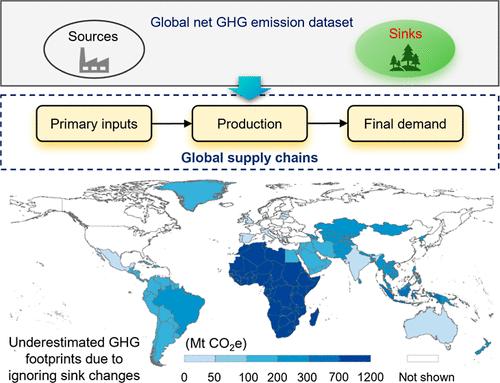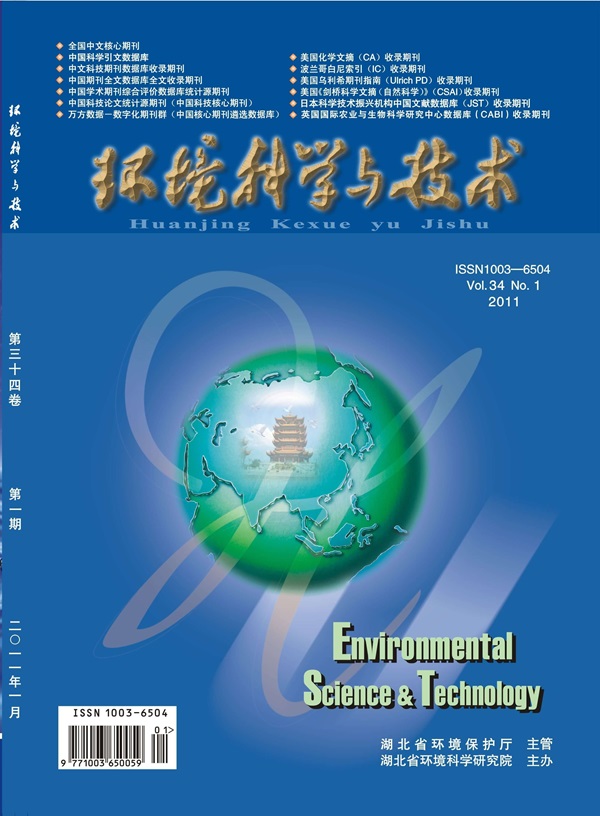因汇流变化而显著改变的国家温室气体足迹
IF 11.3
1区 环境科学与生态学
Q1 ENGINEERING, ENVIRONMENTAL
引用次数: 0
摘要
除了源的温室气体排放外,汇的温室气体清除对于到2050年实现净零排放目标至关重要。温室气体源和汇都通过国际贸易受到当地和偏远社会经济活动的影响。然而,国际贸易对全球温室气体净排放的影响仍然未知。本研究从消费角度估计了各国的温室气体净排放量,同时考虑了受人类活动影响的温室气体源和汇。结果表明,全球26%的温室气体净排放体现在国际贸易中。如果只考虑源而忽略汇的变化,热带国家的温室气体足迹将被严重低估,特别是在印度尼西亚(占其温室气体足迹的65%)和非洲(44%)。考虑碳汇变化后,加工食品和动物产品消费对热带国家温室气体足迹的影响更大,这主要归因于森林转化排放;通过国际贸易从热带国家(如印度尼西亚)向其他国家(如印度和美国)的温室气体泄漏更为突出。这些结果强调了汇变化在评估温室气体足迹中的重要性。它们可以为加快实现净零排放目标提供新的见解。本文章由计算机程序翻译,如有差异,请以英文原文为准。

Greenhouse Gas Footprints of Nations Significantly Reshaped by Sink Changes
In addition to greenhouse gas (GHG) emissions by sources, GHG removal by sinks is essential in achieving the net zero target by 2050. Both the GHG sources and sinks are influenced by local and remote socioeconomic activities through international trade. However, the impacts of international trade on global net GHG emissions remain unknown. This study estimates net GHG emissions of nations from the consumption perspective, considering both GHG sources and sinks influenced by human activities. Results show that 26% of global net GHG emissions were embodied in international trade. GHG footprints in tropical nations would be significantly underestimated if only sources are considered and sink changes are neglected, especially in Indonesia (counting 65% of its GHG footprints) and Africa (44%). After considering sink changes, the consumption of processed foods and animal products exerted larger impacts on GHG footprints of tropical nations, which is mainly attributed to emissions from forest conversion; and the GHG leakage through international trade from tropical nations (e.g., Indonesia) to other nations (e.g., India and the United States) was more prominent. These results highlight the importance of sink changes in assessing GHG footprints. They can offer new insights into expediting the achievement of the net zero target.
求助全文
通过发布文献求助,成功后即可免费获取论文全文。
去求助
来源期刊

环境科学与技术
环境科学-工程:环境
CiteScore
17.50
自引率
9.60%
发文量
12359
审稿时长
2.8 months
期刊介绍:
Environmental Science & Technology (ES&T) is a co-sponsored academic and technical magazine by the Hubei Provincial Environmental Protection Bureau and the Hubei Provincial Academy of Environmental Sciences.
Environmental Science & Technology (ES&T) holds the status of Chinese core journals, scientific papers source journals of China, Chinese Science Citation Database source journals, and Chinese Academic Journal Comprehensive Evaluation Database source journals. This publication focuses on the academic field of environmental protection, featuring articles related to environmental protection and technical advancements.
 求助内容:
求助内容: 应助结果提醒方式:
应助结果提醒方式:


